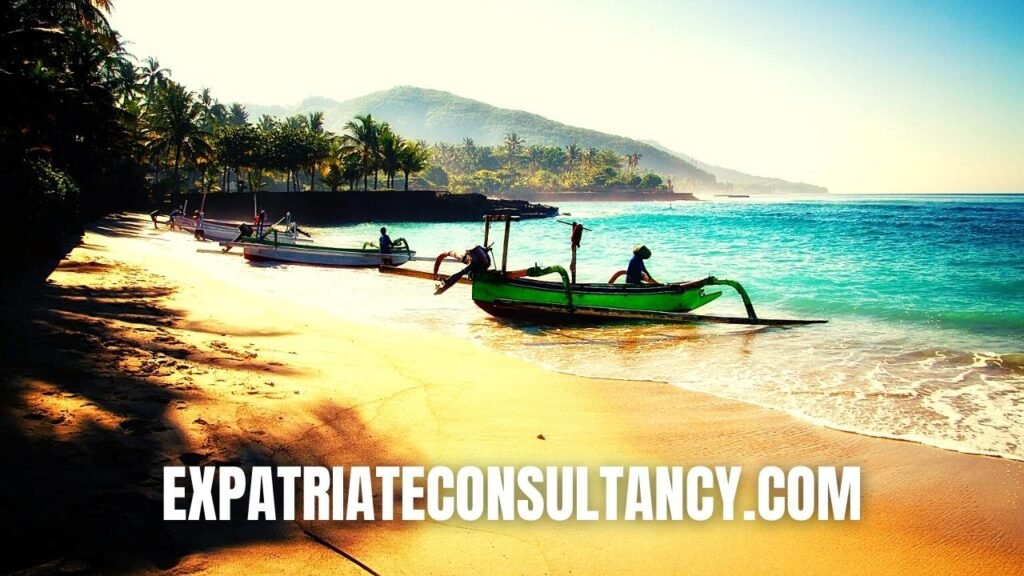Why is nobody talking about this jaw-dropping island that has the absolutely lowest tax rates for foreigners?
See, if you search for information about living in Italy, you will find many videos about it, including mine. Retirement in Greece? Both I and my competitors already talked about it.
The same is valid for Portugal, France, or Spain. But all these countries have way higher taxes than this country I will show you today.
This nation, located on a breathtaking island in the Mediterranean, also has NO inheritance tax, a low cost of living, and almost everyone there speaks English.
If you are from the United States or England, they offer you an attractive permanent residency program for non-EU retirees.
Still, almost nobody talks about them, and that is the craziest mystery of all.
So today I am going to show you the Pros, the Cons, the Cost of Living, and the 2 best cities to retire in Cyprus.
By the end of this video, I am going to tell you a very important alert because if you are not careful, you might end up on the wrong side of this island and risk everything.
We start with the good part…
The Pros of Retiring in Cyprus
We start answering this question:
Is Cyprus really as tax-friendly for expats as people say?
In other of our videos, we talked about how Greece and Southern Italy are attractive to foreign retirees, since both have a special tax program where foreigners pay only 7% in income tax.
In Cyprus, it is EVEN LESS: There, you will pay only a flat 5% tax. On top of that, Cyprus has double-taxation agreements with several countries, like the UK and the US.
So any tax you pay in Cyprus can be discounted from the amount you would pay to the US, for example. Cyprus also has ZERO inheritance or gift taxes, which is an often ignored but extremely important benefit for the families of retirees.
Because you might ask: How do Cyprus’s tax benefits compare to European nations? Well, in countries like the UK, from 20% to 40% of what you will pass on to your family will be taken by the government.
In Cyprus, it is ZERO – any inheritance that you pass will NOT be taxed. It is a case similar to Malta, which I covered in this video here (the link is also in the description).
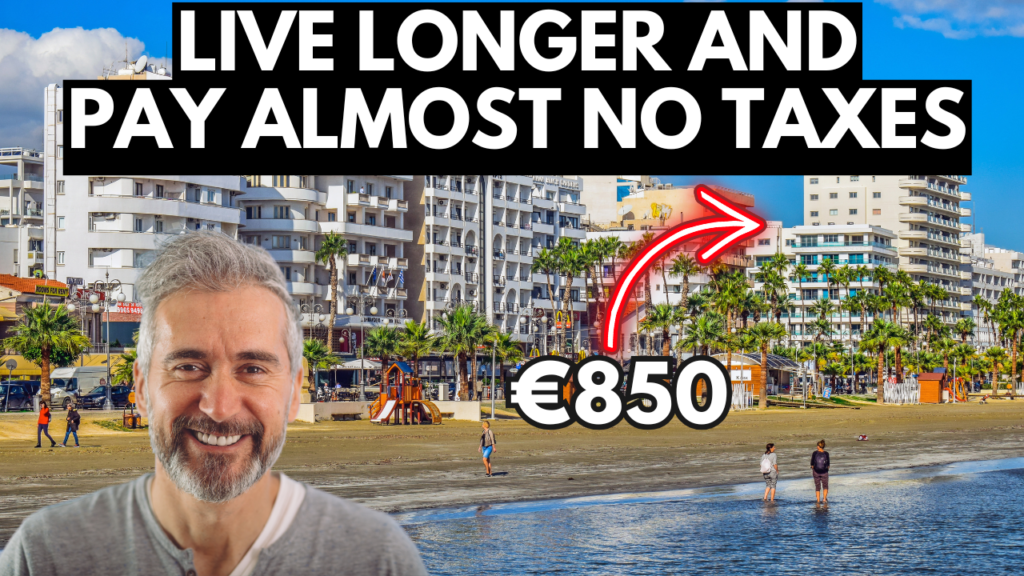
The Benefits of the GESY Healthcare System

Another pro of moving to Cyprus that is important for foreign retirees is the healthcare quality. Cyprus has a general healthcare system, also known as GESY, which is quite interesting because it is a hybrid of private and public healthcare.
It was implemented in 2019, and beneficiaries have access to a wide range of healthcare services, from primary care to specialized treatments, with minimal co-payments. Of course, the GESY has its flaws, but British citizens who reside in Cyprus often say that the GESY is far better than the British NHS, for example.
This is what a resident told us: “The Cypriot Gesi is an NHS that has the market and the private sector integrated into it. As a result, it has checks and balances that the NHS does not.”
In addition to the GESY, Cyprus has a well-developed private healthcare sector. Private hospitals and clinics are equipped with modern medical technologies and staffed by highly qualified professionals, many of whom have trained internationally.
And the cost of medical treatments in Cyprus is quite affordable, to the point that there is a growing medical tourism industry there.
Yes, people from all over Europe (and even from farther places) travel to Cyprus due to the affordability of certain procedures there. To put it into perspective, in Cyprus a rhinoplasty (a surgery also known as nose reshaping) costs the equivalent of US$3600.
While in the US, it costs more than twice that price.
The next advantage of Cyprus is easy to guess – it is very safe.

Safety: A Big Plus for Retirees in Cyprus
And why is this obvious? Because in general, European islands tend to be very safe.
Crime like car theft, for example, is extremely rare—it is hard for someone to escape with a stolen car from an island, right?
If we talk about homicides, in the entire 2023, Cyprus had 11 cases. Not 11 per city, or 11 per 100,000 residents – no, no, no – I mean 11 in the entire country, in the entire YEAR.
We are talking about a country with almost 1 million people. For comparison, the city of Atlanta in the US, which has half the population of Cyprus, had 135 homicides in 2023.
So an American city with HALF of the population of Cyprus had more than 12 times the number of homicides Cyprus had. This is how safe is this place.
The next positive aspect of Cyprus is probably the one that makes you think about this island in the first place: The Delightful Mediterranean Climate.
To Retire in Cyprus Comes Has The Mediterranean Climate in the Package
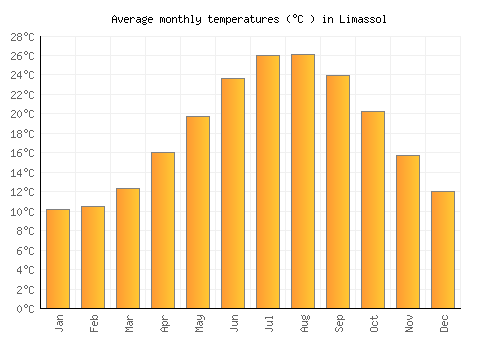
Cyprus has one of the sunniest climates in Europe, with over 300 days of sunshine each year. Winters are mild, and summers are long and warm.
Average temperatures range from 16°C (60°F) in January to 32°C (90°F) in July. Even in winter, many days are sunny, with comfortable temperatures.
If you suffer from arthritis or SAD, this country might be a relief from your problems.
This pleasant climate allows expats and retirees to stay active and healthy. Whether it’s walking along the coast, dining outside, or just strolling on the sidewalks, the Mediterranean weather invites you to spend time outside.
Just out of curiosity, I have been to Cyprus multiple times, and every time I go there, I walk more than 20,000 steps per day. It is just too nice to stay inside.
The consistent, sunny weather also has health benefits. Sun exposure helps increase Vitamin D levels, important for bone health and immune function.
And, as an additional perk, the Mediterranean climate is very good for wine production – and Cyprus has a winemaking tradition spanning almost 5000 years!
English-Speaking Communities and Networks
The next pro of Cyprus is that English is widely spoken there. Due to its strong tourism vocation and years under British administration, most locals speak English.

Especially in cities and areas popular with expats, such as Limassol and Paphos, road signs, menus, and official documents are often available in English.
Cyprus is also home to a thriving expatriate community, especially British expats. The expat network offers social support, activities, and events for newcomers.
It’s easy to meet people with similar interests and backgrounds, which helps new residents settle in quickly. However, and this is a very important point, remember that the main language in Cyprus is Greek.
And I strongly recommend you try to learn a bit of Greek if you plan to move to Cyprus. It is not the easiest language, but once you start to speak it, your life will be so much better.
The difference in your daily interactions with the locals is mindblowing. The method I use to learn new languages is this one (by using this link you get a 40% discount after trying for free, and if you subscribe, you’ll get a 40% discount!) The connections you build and the confidence you gain simply transform the way you experience a new culture. Learning a new language with LingQ truly opens doors to opportunities you never thought possible, allowing you to immerse yourself deeply and naturally. You’ll find yourself understanding not just the words, but the essence of the conversations, making every interaction more meaningful.

Why Non-EU Citizens Should Consider Moving to Cyprus
Now, back to the subject of Cyprus, let’s say that you are a non-EU citizen, for example, an American or a British citizen. This next positive aspect is for you!
Probably you are aware that as a non-EU citizen, many European countries impose a bigger burden of bureaucracy to give you a long-term visa or a residence, right? Countries like France, for example, do not make it easy.
But this is not the case in Cyprus! They have several visa programs that make it straightforward for non-EU retirees to gain residency.
The most common option is the Category F residence permit. This permit is available to expats who can prove they have enough income to support themselves without working.
The Category F permit requires proof of income of at least €9,568 per year, plus an additional €4,613 for a spouse. Once approved, this permit allows retirees to live in Cyprus year-round.
Another attractive option is the Golden Visa program, available to those who invest at least €300,000 in real estate. This route offers a faster track to permanent residency, with less paperwork and more flexibility.
And if you are curious about what kind of properties you can buy in Cyprus with €300,000, in a few minutes I will show you that, and you will be amazed.
So, by now you already know that Cyprus has at least 6 very attractive pros for expat retirees and even digital nomads. But what about the cons?
The Downsides of Moving to Cyprus
So, what are the negative sides of moving and retiring in Cyprus?
Weather Extremes
Well, remember when I said that the Mediterranean weather is one of the best things in Cyprus? This is very true if you are used to very hot days, like me or like my brother, who lives in Texas.
BUT… if that is not your case… Summers in Cyprus can be brutally hot, with July and August temperatures often soaring above 40°C (104°F), especially inland.
While coastal areas stay a bit cooler, the average highs still hover around 33°C (91.4°F). If you are not used to that, staying indoors or in shaded areas during the hottest part of the day becomes almost essential.
Transportation and Driving Habits

Another thing that is not the best in Cyprus is the public transportation, particularly for those used to extensive transit systems in other parts of Europe.
Buses are the main form of public transit, but service can be limited outside major cities and isn’t as frequent or reliable as one might hope. Owning a car becomes almost a necessity for those living outside the city centers, which brings added costs like fuel, insurance, and maintenance.
Plus, there is the issue of the driving skills of many residents. That unique driving style can be a bit of a shock to newcomers.
It’s common to encounter quick lane changes, speeding, and other violations, especially in busy areas. This is what a local resident told us:
“They run red lights regularly. Seriously, be very careful at lights; when it turns green, do not go immediately. Make sure no cars will be running the red light first. I’m very serious. Parking is an absolute total disaster. Cypriots will park on a roundabout if it will save them 1 minute of walking.”
Well, the good news is that Cyprus has relatively cheap fuel prices – in the entire European Union, only Malta and Bulgaria have cheaper fuel prices.
The next negative aspect of living in Cyprus is also something that is present in another destination that we covered: Sicily, in Italy.
I am talking about the water shortages.
Cyprus is known for its warm, dry climate, but that also means it faces water scarcity issues. The island’s average rainfall is significantly lower than in many parts of Europe, making water shortages a common occurrence.
To manage this, Cyprus has invested in desalination plants and water conservation measures, but restrictions are still implemented during especially dry periods. Water bills can also be higher than expected due to the cost of processing and importing water.
And since we are talking about bills, let’s not forget the high electricity costs.
It is among the highest in Europe, partly because the island depends on imported fuels for its energy needs.
In fact, for smaller consumers, like singles, couples, or even small families, Cyprus has the absolute highest price per kWh of electricity in Europe: €0.62 per kWh. For comparison, this is 57% more than the price in Portugal.
So those air-conditioning bills will not be cheap. Investing in energy-efficient appliances can help, but the upfront costs may be significant.

So now you know the pros and cons of Cyprus, and likely you realize that the advantages offset the negative side by a fair gap. The next question that comes then is:
What are the 2 best cities in Cyprus to move to for retirement?
Although I mention “retirement,” these cities are also great if you are a digital nomad or a remote worker because they offer high quality of life and all the infrastructure you need.
Limassol
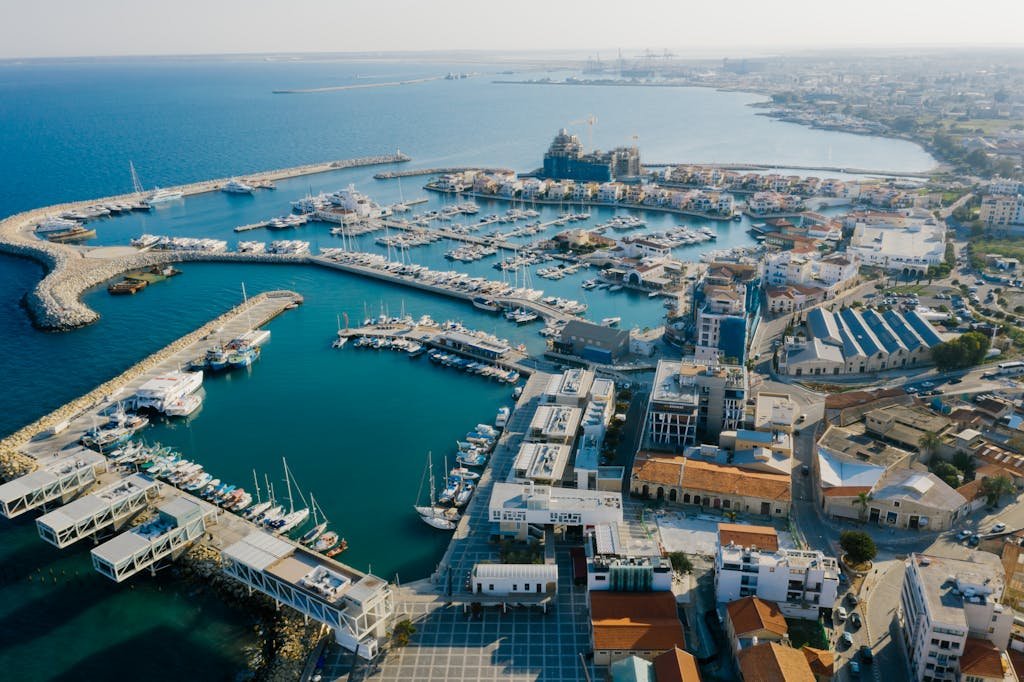
The first city is Limassol, which was the most mentioned name when I asked residents in Cyprus what is the best city on the island. Located on Cyprus’s southern coast, Limassol is the country’s second-largest city, just after Nicosia.
While the city itself has around 110,000 residents, the urban area has close to 200,000 people. According to a local, Limassol is better than other cities in Cyprus because while Nicosia has a lot of people but no beaches, and Paphos or other cities have beautiful beaches but almost no people, Limassol has the perfect blend of beaches and an ideal amount of people to ensure that you don’t get bored.
So, according to residents, it is a very balanced city. Another positive side of Limassol is its large expatriate community. English is widely spoken, easing the transition for those moving from abroad.
The city’s infrastructure caters well to an international population. Medical facilities are top-notch, with both private and public options available, and many healthcare providers speak English.
The Marina is a centerpiece of the city, with luxury yachts, waterfront cafes, and shops lining the harbor. Limassol is considered one of the 100 best cities in the world in terms of quality of living, according to Mercer’s Quality of Living ranking.
However, all that comes at a price. When we asked one of the locals what is the best city in Cyprus for expats, he told us that:
“Limassol is the best, but it’s ridiculously expensive.”
Another local gave us a more complete description of the city:
“Limassol has nice people who enjoy life in general and are quite friendly and outgoing. Plenty of restaurants not necessarily expensive.
Nightlife is quite good for all tastes of music, and it has a very nice promenade, and in general, has a nice vibe as a city. Until 5-10 years ago I would say Limassol was the best by far, but the reason I can’t say that it is the best anymore is the ridiculously high cost of living.”
While it is natural that locals will find Limassol expensive, since it is even more expensive than the capital Nicosia, it is important to remember that Cyprus is not an expensive country.
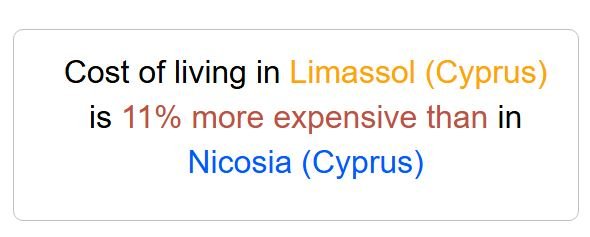
When we compare the most expensive city in Cyprus to other cities in Europe or North America, we see that Limassol is not that expensive.
For example, life there is 31% cheaper than in Fort Lauderdale, Florida,

or 26% cheaper than in Brighton, England.
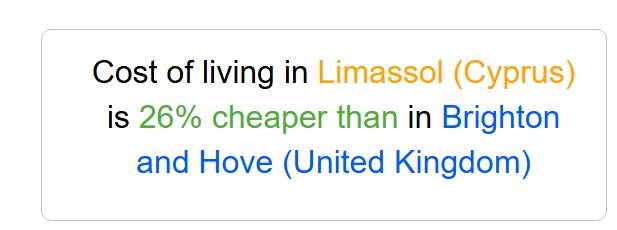
Needless to say that Limassol is not only cheaper, but also has much better weather in this case.
Remember when I mentioned before that by buying a property of at least €300,000, the Cypriot government provides you with a golden visa and residency?
In Limassol, for a price close to that, you can buy this large 170sqm apartment, and just at a walking distance from the Marina!
If you prefer to rent, there you can find a 65sqm apartment with a spectacular view, located just 50m from the beach and already fully furnished, for just €1,350 per month—which means something around US$1450.
This is far less than the average rent in Chicago, for example. But still, by Cypriot standards, Limassol is indeed expensive.
What if I told you that there is another city, less than 1 hour distant from Limassol, which has a decent infrastructure, lovely beaches, and the prices there are way, way cheaper than in Limassol?
I am talking about Larnaca.
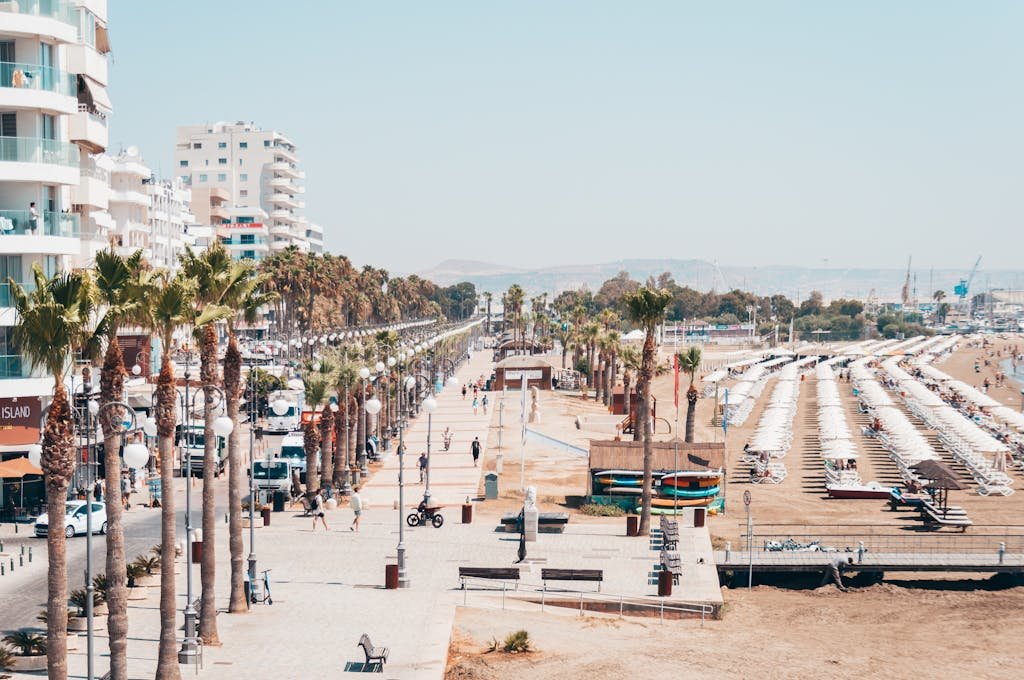
Located on the southeastern coast of Cyprus, Larnaca is a charming city with about 85,000 residents.
The thing about it is that many locals will say that the beaches in Larnaca are not as nice as in Limassol, and this is a matter of personal opinion.
Honestly, I found Mckenzie Beach, one of the many beaches from Larnaca, quite pleasant. Larnaca is also in a more central location, so you are much closer to the spectacular, dazzling, and unbelievably beautiful beaches of eastern Cyprus.
I am talking about places like Fig Tree Bay Beach, which is not only among the most beautiful in Cyprus but in all of Europe. But the advantages of Larnaca go beyond the beaches and the location.
Larnaca’s heart is its scenic coastline, especially along Finikoudes Beach, a palm-lined area brimming with cafes, restaurants, and shops. Here, it’s common to see locals and expats alike enjoying a morning coffee or an evening stroll.
Another highlight is the easy travel access thanks to the…
Larnaca International Airport, the largest airport in Cyprus.
If one day you get bored and want to visit somewhere else, using this airport, you can hop on a Wizz Air or Ryanair flight and visit almost any country in Europe, for just a few dozen euros.
This is what a local told us about Larnaca:
“I recommend Larnaca 100%. It’s quieter, more laid back, and has loads of natural beauty—if that’s your style.
Limassol and Nicosia are a bit of concrete jungle cities and much busier—not my thing personally. Also, Larnaca is more in the center of the island so you are 25 minutes away from Nicosia, 35 minutes away from Limassol, and 25 minutes away from Protaras/Agia Napa.”
Despite being smaller than Limassol, Larnaca still has a decent infrastructure and nearly all the urban amenities an expat would expect.
Healthcare in Larnaca
In terms of healthcare, for example, the Larnaca General Hospital is the primary public healthcare facility in the city and provides a wide range of medical services.
But there are also the Saint Raphael, a well-known private hospital offering specialized medical care with modern facilities, and the American Medical Center, a private clinic providing various healthcare services.
There is a large shopping mall—the Metropolis Mall—with over 100 stores, including international brands like Zara, Mango, and Marks & Spencer, as well as a variety of restaurants and cafes.
And, again, it is my personal opinion, but I find the public bus network in Larnaca quite decent—I never had any issue hopping to different parts of the city using it. The ticket costs only €2.4.
Housing Costs in Larnaca
In Larnaca, you can easily rent a 85sqm apartment with a sea view for just €850 per month—this is less than US$920.
If you prefer to buy a property of at least €300,000 to win a Cyprus golden visa, in Larnaca, you can find some really interesting opportunities.
Like this 145sqm maisonette located just 230 meters from the sea and with swimming pool access, just for €320,000.
Now you know all that about Cyprus, BUT… There is still one thing missing in this episode. A thing that you MUST be very careful with.
As I said in the beginning, you must take care to NOT end up buying property on the wrong side of the island. Cyprus is a divided island, with the southern part recognized internationally as the Republic of Cyprus—and this is the part where all the cities we mentioned today are located.
Meanwhile, the northern part of the island has been under Turkish occupation since 1974. The northern area, often referred to as the “Turkish Republic of Northern Cyprus,” is not recognized by any country except Turkey.
This political situation has major implications for property ownership and legality, especially for foreigners.
Buying property in the northern region comes with significant risks. Many properties in the north were originally owned by Greek Cypriots before the division, and these properties were left behind when their owners fled south.
Purchasing one of these properties could mean unknowingly buying land or a home that was seized without proper title or ownership rights.
In contrast, property purchases in the Republic of Cyprus, the southern part of the island, follow clear legal procedures recognized internationally.
And that is why Cyprus is among the 7 best countries to retire in Europe – check here to discover the other 6.
Levi Borba is the founder of expatriateconsultancy.com, creator of the channel The Expat, and best-selling author. You can find him on X here. Some of the links above might be affiliated links, meaning the author earns a small comission if you do a purchase.
